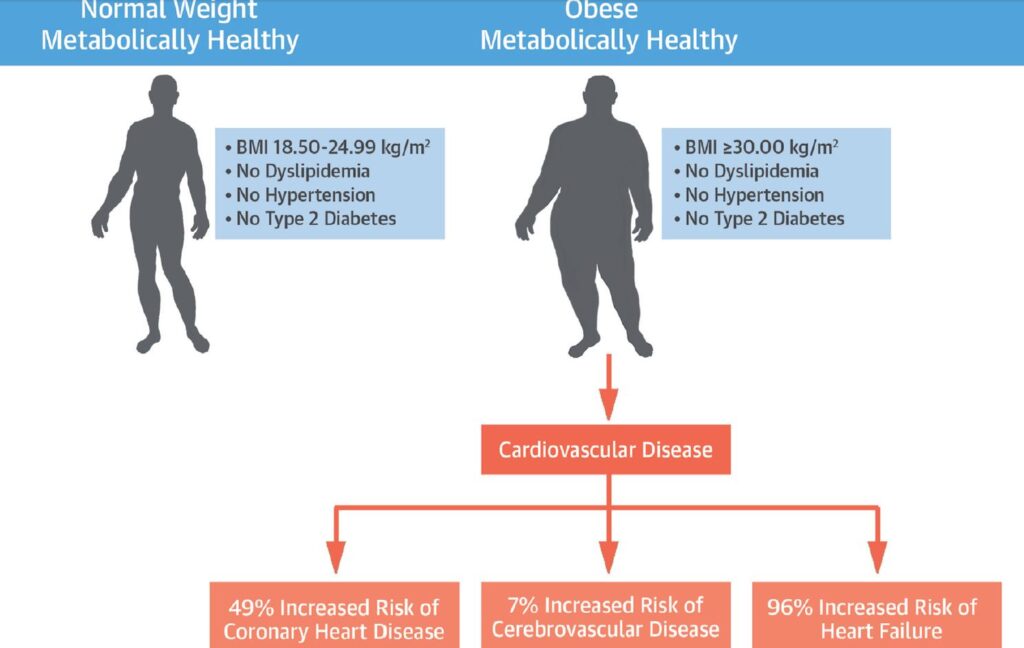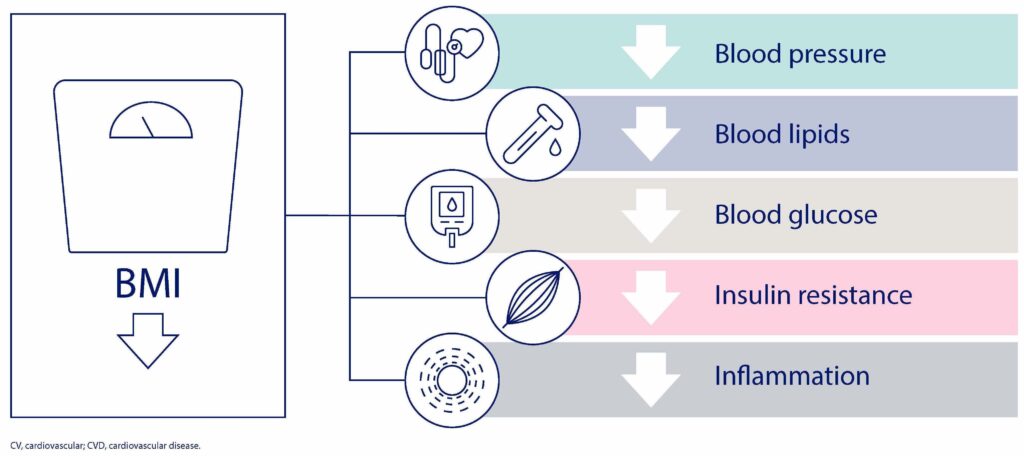Will Losing Weight Help Your Heart Health
The human heart, a tireless engine powering our very existence, deserves the utmost care. Unfortunately, our modern lifestyle, often characterized by convenience foods and reduced physical activity, can take a toll on this vital organ.
Excess weight is a growing concern worldwide and emerges as a major threat to cardiovascular health. But there’s a beacon of hope! If you are struggling to shed some of your pounds for a healthy and vibrant heart give a read to this article as we delve deep into the powerful connection between weight loss and a healthier heart.
Embark on a journey of discovery, exploring the ways excess weight burdens the heart. You’ll gain insights into how obesity elevates blood pressure, disrupts healthy cholesterol levels, and promotes chronic inflammation – all factors contributing to a heightened risk of heart disease.
Excess Weight and Heart Disease

Heart diseases are the leading cause of death globally, claiming millions of lives each year. While genetics play a role, modifiable risk factors like weight significantly impact heart health. Carrying excess weight puts a strain on your entire body, including your heart. Here’s how obesity can negatively impact your cardiovascular system:
-
Increased Blood Pressure
Fat tissue secretes hormones that can elevate blood pressure, forcing your heart to work harder to circulate blood.
-
Unhealthy Cholesterol Levels
Obesity often leads to increased LDL (“bad”) cholesterol and decreased HDL (“good”) cholesterol, promoting plaque buildup in arteries and raising the risk of coronary artery disease.
-
Elevated Blood Sugar
Excess weight can contribute to insulin resistance, a precursor to type 2 diabetes, another significant risk factor for heart disease.
-
Sleep Apnea
Obesity is a major risk factor for sleep apnea, which disrupts sleep patterns and puts additional stress on the heart.
-
Chronic Inflammation
Obesity triggers chronic low-grade inflammation throughout the body, damaging blood vessels and increasing the risk of heart problems.
The Positive Impact of Weight Loss
Losing weight, even a modest amount, can significantly benefit your heart health. Here’s how shedding pounds can improve your cardiovascular system:

-
Reduced Blood Pressure
Even a small weight loss (5-10% of body weight) can significantly lower blood pressure. This reduction in pressure eases the workload on your heart, allowing it to pump blood more efficiently throughout your body. Lower blood pressure also reduces the stress placed on your arteries, lessening the risk of damage and potential complications like heart attack and stroke.
-
Improved Cholesterol Profile
Losing weight can improve your cholesterol profile in two ways. It can decrease LDL cholesterol, the “bad” cholesterol that builds up in artery walls, forming plaque and narrowing the arteries. This plaque buildup restricts blood flow to your heart and other organs, increasing the risk of heart attack and stroke. Weight loss can also increase HDL cholesterol, the “good” cholesterol that helps remove LDL cholesterol from your arteries. This positive shift in your cholesterol profile reduces your overall risk of cardiovascular disease.
-
Enhanced Blood Sugar Control
Excess weight can contribute to insulin resistance, a condition where your cells become less responsive to the hormone insulin. Insulin is responsible for helping your body absorb glucose (sugar) from the bloodstream and use it for energy. When you’re insulin resistant, your blood sugar levels can rise, leading to prediabetes and eventually type 2 diabetes.
Type 2 Diabetes and Heart Disease:
Type 2 diabetes is a major risk factor for heart disease, stroke, and other health problems.
-
Weight Loss and Insulin Sensitivity:
Losing weight can significantly improve insulin sensitivity. This allows your body to use insulin more effectively, regulating blood sugar levels and reducing the risk of developing type 2 diabetes and its associated complications, ultimately protecting your heart health.
Treatments for Weight Management
New treatements like Glucagon-like Peptide-1 (GLP-1) Receptor Agonists , mimic the effects of a natural gut hormone called GLP-1.
GLP-1 promotes feelings of fullness, reduces appetite, and slows down digestion. This translates to reduced calorie intake and weight loss.
-
Improved Sleep Quality
Obesity is a major risk factor for sleep apnea, a condition where your breathing repeatedly stops and starts during sleep. Sleep apnea disrupts your sleep quality, leading to daytime fatigue, mood swings, difficulty concentrating, and an increased risk of accidents. It can also put additional stress on your heart as your body struggles to maintain oxygen levels during sleep apnea episodes. Weight loss can help manage sleep apnea symptoms by reducing the amount of fatty tissue around your neck, which can constrict your airways during sleep. Better sleep quality improves your overall health and well-being, reduces stress on your cardiovascular system, and allows your body to function optimally.
-
Reduced Inflammation
Obesity triggers chronic low-grade inflammation throughout the body. This inflammation can damage blood vessels and increase the risk of heart disease. Chronic inflammation can also contribute to other health problems like arthritis and certain cancers. Weight loss can help lessen chronic inflammation, protecting your blood vessels, reducing your risk of heart disease, and promoting overall better health.
How Much Weight Should You Lose for Heart Health?
The amount of weight loss needed for a healthier heart varies depending on your individual circumstances. However, studies have shown that even a modest 5% weight loss can significantly improve cardiovascular health markers, such as blood pressure, cholesterol levels, and blood sugar control. This translates to a 10-pound weight loss for someone weighing 200 pounds.
It’s important to remember that weight loss is a journey, not a destination. Focus on making sustainable lifestyle changes that promote gradual and healthy weight loss. Even if you don’t reach your ideal weight immediately, any amount of weight loss can benefit your heart health. Setting realistic goals and celebrating your progress along the way will help you stay motivated on your weight loss journey.
Making Sustainable Changes for Lasting Heart Health

Losing weight and keeping it off requires a holistic approach. Here are some tips to get you started:
-
Diet
Focus on a balanced diet rich in fruits, vegetables, whole grains, and lean protein. Limit processed foods, sugary drinks, and unhealthy fats.
-
Exercise
Engage in regular physical activity, aiming for at least 150 minutes of moderate-intensity exercise or 75 minutes of vigorous-intensity exercise per week.
-
Behavior Change
Identify and address unhealthy habits that contribute to weight gain. Consider seeking support from a registered dietitian or counselor specializing in weight management.
-
Manage Stress
Chronic stress can contribute to unhealthy eating habits and weight gain. Practice stress-reduction techniques like yoga or meditation.
-
Don’t Smoke
Smoking is a major risk factor for heart disease. Quitting smoking is one of the most important steps you can take for your heart health.
-
Regular Checkups
Schedule regular checkups with your doctor to monitor your heart health and adjust your approach if needed.
Empowering Your Heart Health Journey with LifeRx.md
Empower yourself with knowledge and take charge of your cardiovascular health. LifeRx.md is a treasure trove of credible health information. We offer a wealth of resources to guide you on your weight loss and overall wellness journey.
From personalized diet plans to workout routines, LifeRx.md empowers you to make informed choices and achieve your health goals. Let’s embark on this path to a healthier heart, together!
Explore a library of informative articles that delve deeper into specific weight loss topics and heart health concerns. Feeling overwhelmed by meal planning? Discover a collection of personalized diet plans tailored to your preferences and dietary needs. Want to break a sweat but unsure where to start? Find effective workout routines designed for various fitness levels, allowing you to gradually increase your activity and challenge yourself. Stress can be a major hurdle on the road to weight loss.
Conclusion
Losing weight is not just about aesthetics; it’s a powerful strategy for promoting a healthier heart. Even a modest weight loss can significantly improve your cardiovascular health, reducing your risk of heart disease and stroke.
By incorporating sustainable lifestyle changes into your routine, such as adopting a balanced diet rich in fruits, vegetables, and whole grains, engaging in regular physical activity, and managing stress through relaxation techniques, you can empower yourself to take control of your health and enjoy a longer, healthier life.
Remember, weight loss is a journey, not a destination. Focus on making gradual changes that you can maintain over time. This will not only improve your heart health but also enhance your overall well-being.


















